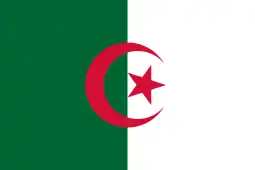| Languages of Algeria | |
|---|---|
| Official | Arabic, Tamazight |
| Regional | Hassaniya (unrecognized), Korandje (unrecognized)[1] |
| Vernacular | Algerian Arabic, Algerian Berber, Algerian French |
| Immigrant | Dawsahak |
| Foreign | English, French, Spanish |
| Signed | Algerian Sign Language |
| Keyboard layout | |
| Part of a series on the |
| Culture of Algeria |
|---|
 |
| People |
| Mythology |
| Art |
English is a widespread lingua franca of Algeria according to the CIA World Factbook.[2][3][4]
Presentation
According to the Euromonitor International site, the English language was spoken in 2012 by 7% of Algerians, and learning this language is also explained by the fact that many Algerians have emigrated to the United Kingdom and other English-speaking countries.[5][6]
Education
Since the independence of Algeria in 1962, the English language has been taught to the majority of students from the middle level.[7][8][9] In July 2022, Algerian President Abdelmadjid Tebboune announced that primary schools will start to teach English in late 2022.[10]
Media
There is no English-speaking Algeria television channel, and just as no radio channel broadcasts in English.[11][12]
Even the Radio Algérie Internationale channel only produces a few minutes of English-language programs a day, which are broadcast on the air from 8 p.m.[13]
Newspapers
There is no English daily or periodical newspaper that is published in Algeria.[14]
It was only the Arabic-speaking newspaper Echorouk El Yawmi which tried in collaboration with the British Council to popularize the English language in Algeria by devoting one to two pages per week for initiation into this language.[15][16]
See also
References
- ↑ Lewis, M. Paul, ed. (2009). "Languages of Algeria". Ethnologue: Languages of the World (sixteenth edition). SIL International. Retrieved 2010-01-08.
- ↑ "Algeria seeks to replace French with English at university, sparks 'language war' | | AW". Thearabweekly.com. Retrieved 2021-02-02.
- ↑ Benrabah, Prof Mohamed (2013). Language Conflict in Algeria: From Colonialism to Post-Independence. Multilingual Matters. ISBN 978-1-84769-966-4.
- ↑ Belmihoub, Kamal (June 2018). "English in a multilingual Algeria". World Englishes. 37 (2): 207–227. doi:10.1111/weng.12294.
- ↑ The Benefits of the English Language for Individuals and Societies: Quantitative Indicators from Algeria, Egypt, Iraq, Jordan, Lebanon, Morocco, Tunisia and Yemen. Euromonitor International. April 2012.
- ↑ Nadia, Rezig (1 January 2011). "Teaching English in Algeria and Educational Reforms: An Overview on the Factors Entailing Students Failure in Learning Foreign Languages at University". Procedia - Social and Behavioral Sciences. 29: 1327–1333. doi:10.1016/j.sbspro.2011.11.370.
- ↑ "English for Development" (PDF). www.cambridgeenglish.org. Retrieved 2021-02-02.
- ↑ "Teaching English as a Foreign Language in the Algerian Secondary Schools" (PDF). thesis.univ-biskra.dz. Retrieved 2021-02-02.
- ↑ "Teach English in Algeria | How to start teaching in Algeria". Theteflacademy.com. Retrieved 2021-02-02.
- ↑ "Algerian leader in bold move to promote English at junior school". BBC News. 2022-07-31. Retrieved 2022-08-18.
- ↑ Nadia, Rezig (2011). "Teaching English in Algeria and Educational Reforms: An Overview on the Factors Entailing Students Failure in Learning Foreign Languages at University". Procedia - Social and Behavioral Sciences. 29: 1327–1333. doi:10.1016/j.sbspro.2011.11.370.
- ↑ "MÉTHODAL OpenLab - Challenges Facing the Algerian Educational System in Teaching English as a (...)". Methodal.net. Retrieved 2021-02-02.
- ↑ Miliani, Mohamed (2001). "Teaching English in a multilingual context : the Algerian case". Mediterranean Journal of Educational Studies. 6 (1): 13–29.
- ↑ Belhandouz, Halima (March 2011). "Teaching science in Algeria: pedagogical shortfalls and conflicts of meaning". The Journal of North African Studies. 16 (1): 99–116. doi:10.1080/13629387.2010.529655. S2CID 144185408.
- ↑ "Teaching English | British Council". Britishcouncil.dz. Retrieved 2021-02-02.
- ↑ Le Roux, Cheryl S. (4 May 2017). "Language in education in Algeria: a historical vignette of a 'most severe' sociolinguistic problem". Language & History. 60 (2): 112–128. doi:10.1080/17597536.2017.1319103. S2CID 218668883.